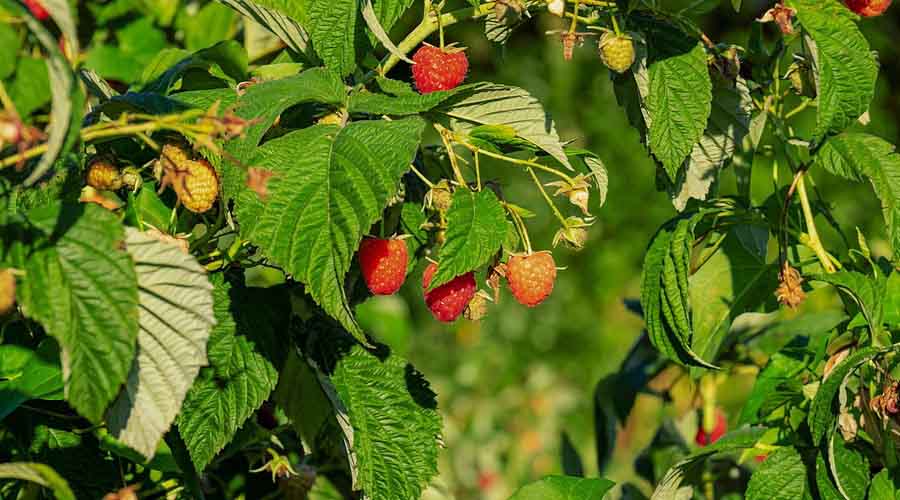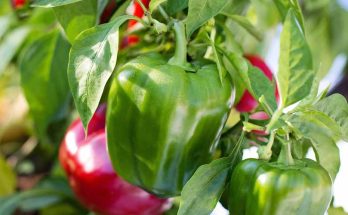Raspberry companion plants. The raspberry bush is a perennial crop that is easily grown naturally in the garden. So if you have decided to plant some raspberry plants in your garden then you may face some problems at first. Because at the beginning of planting, they struggle to grow throughout the season and produce very little fruit during this time. However, good results can be expected later with beneficial companion planting, regular care, and pruning. Companion planting plays an important role in a garden. Therefore, more importance should be given to planting beneficial companion plants.
Contents
Raspberry Companion Plants
Among the myriad of plants that profit from companion planting, snorts, those luscious, sweet-courtesan berries cherished by gardeners and food suckers likewise, have their own set of ideal companions. These jeer companion plants play a pivotal part in not only maximizing the yield and quality of the snorts but also in promoting a thriving and harmonious ecosystem within your garden. In this disquisition of jeer companion plants, we will claw into the art and wisdom of pairing snorts with other foliage to produce a thriving and mutually salutary garden terrain. Whether you are a seasoned gardener or a neophyte with a green thumb, understanding the principles of jeer companion planting can unleash the eventuality for a bountiful, healthy, and vibrant garden.
Good Companion Plants For Raspberry
Companion planting is a gardening strategy that harnesses the power of factory hookups to produce a healthier and more productive garden. When it comes to snorts, these tasteful berries can profit greatly from the company of certain companion plants.
Swiss Chard Companion Plants | 32 Good And Bad Companion Plants For Swiss Char
In this blog post, we’ll explore 21 jeer companion plants, each with its unique set of benefits and benefactions to the garden ecosystem.
Nasturtiums
Nasturtiums not only add vibrant colors to your garden but also attract aphids and beetles down from your precious snorts.
Marigolds
Marigolds emit a strong scent that deters aphids, nematodes, and other pesky garden pests.
Chives
Chives are excellent at repelling aphids and Japanese beetles while promoting the growth of your jeer backwoods.
Garlic
Factory garlic is hard to forfend off aphids and spider diminutives that persecute snorts.
Raspberry Companion Plants Borage

Borage attracts pollinators, improves soil health, and enhances the overall vitality of your jeer patch.
Comfrey
Comfrey is a dynamic accumulator, perfecting the soil with essential nutrients to support jeer growth.
Lavender
Lavender’s aroma acts as a natural pest repellent, guarding your snorts from unwanted interferers.
Yarrow
Yarrow attracts salutary insects while helping to ameliorate soil structure for healthier jeer plants.
Mint – Raspberry Companion Plants
Mint’s scent can discourage aphids and other jeer pests, making it an excellent companion.
Tansy
Tansy is an important supporter in inhibiting ants and flying insects from overrunning your jeer patch.
Dill
Dill attracts salutary insects like ladybugs and parasitic wasps that prey on jeer pests.
Oregano
Oregano is a natural pest repellent that can discourage jeer-loving insects and attract pollinators.
Raspberry Companion Plants Thyme
Thyme helps keep spider diminutives and other pests at bay while adding flavor to your dishes.
Rosemary
The strong scent of rosemary can discourage a wide range of garden pests, making it a precious companion.
Chamomile
Chamomile attracts salutary insects and improves soil quality for robust jeer growth.
Calendula
These vibrant flowers discourage aphids and bring in pollinators to profit your jeer patch.
Sunflowers – Raspberry Companion Plants
Sunflowers give shade to snorts and attract salutary insects to maintain a balanced ecosystem.
Rhubarb
Planting rhubarb near helps discourage pesky Japanese beetles from overrunning your jeer backwoods.
Catnip
Catnip deters aphids and attracts salutary insects, all while intriguing your nimble musketeers.
Bee Balm
Bee attar attracts notions and other pollinators, icing a bountiful jeer crop.
Clover
Planting clover as a ground cover improves soil health and attracts salutary insects, fostering a thriving jeer ecosystem.
Raspberry Companion Plants Chart
The raspberry companion plants chart is given below tables:
| Serial | Companion Plants | Benefits |
| 1 | Nasturtiums (Tropaeolum majus) | Colorful flowers attract aphids and beetles away from raspberries. |
| 2 | Marigolds (Tagetes) | Strong scent deters aphids, nematodes, and other garden pests. |
| 3 | Chives (Allium schoenoprasum) | Repels aphids and Japanese beetles while enhancing raspberry growth. |
| 4 | Garlic (Allium sativum) | Planting garlic nearby helps deter raspberry-loving pests like aphids and spider mites. |
| 5 | Borage (Borago officinalis) | Attracts beneficial pollinators and improves overall soil health. |
| 6 | Comfrey (Symphytum officinale) | Known as a dynamic accumulator, enriches the soil with nutrients. |
| 7 | Lavender (Lavandula spp.) | Strong scent repels various raspberry pests. |
| 8 | Yarrow (Achillea millefolium) | Attracts beneficial insects and improves soil structure. |
| 9 | Mint (Mentha spp.) | Deters aphids and other raspberry pests. |
| 10 | Tansy (Tanacetum vulgare) | Helps deter ants and flying insects. |
| 11 | Dill (Anethum graveolens) | Attracts beneficial insects like ladybugs and parasitic wasps. |
| 12 | Oregano (Origanum vulgare) | Deters raspberry-loving pests and attracts pollinators. |
| 13 | Thyme (Thymus vulgaris) | Helps deter spider mites and other pests. |
| 14 | Rosemary (Rosmarinus officinalis) | Strong scent deters several garden pests. |
| 15 | Chamomile (Matricaria chamomilla) | Attracts beneficial insects and improves soil quality. |
| 16 | Calendula (Calendula officinalis) | Vibrant flowers deter aphids and attract pollinators. |
| 17 | Sunflowers (Helianthus annuus) | Provide shade and attract beneficial insects. |
| 18 | Rhubarb (Rheum rhabarbarum) | Planting near raspberries can help deter Japanese beetles. |
| 19 | Catnip (Nepeta cataria) | Deters aphids and attracts beneficial insects. |
| 20 | Bee Balm (Monarda spp.) | Attracts bees and other pollinators, benefiting raspberry plants. |
| 21 | Clover (Trifolium spp.) | Planting as ground cover improves soil health and attracts beneficial insects. |
Bad Companion Plants For Raspberry
While companion planting can have multitudinous benefits for snorts, there are also some plants that should be avoided as they may hamper jeer growth or health. Then are some exemplifications of plants that are generally considered bad companions for snorts.
Potatoes
Both snorts and potatoes are susceptible to analogous pests and conditions like Phytophthora, making them poor companions.
Blackberries
Planting snorts and blackberries together can lead to the spread of conditions and increased competition for coffers due to their analogous growth habits.
Tomatoes
Tomatoes can attract the same pests as snorts and may contend for nutrients in the soil.
Peppers
Like tomatoes, peppers can be susceptible to analogous pests and conditions as snorts, and their growth habits may lead to overcrowding.
Brassicas( Cabbage, Broccoli, Cauliflower, etc.)
These plants can release composites that inhibit the growth of snorts and other regenerating plants.
Fennel
Fennel can be allelopathic, releasing chemicals that inhibit the growth of near plants, including snorts.
Mint
While mentioned before as a companion, mint can be invasive and may contend aggressively with snorts for coffers if not contained.
Wisteria
Wisteria can be a vigorous and invasive vine that might catch jeer backwoods.
Cucumbers
Cucumbers can contend for nutrients and space, potentially affecting jeer growth.
Beans
Beans fix nitrogen in the soil, which can lead to an imbalance in nutrient situations for snorts and affect their growth.
Bell Pepper Companion Plants | 35 Good And Bad Companion Plants For Bell Pepper
Note, It’s important to consider the growth habits, nutrient conditions, and vulnerability to pests and conditions when planning companion planting for snorts. Avoiding these bad companions will help ensure a more successful and harmonious jeer garden.
Finally About Raspberry Companion Plants
Incorporating these companion plants into your garden not only enhances the growth and health of your snorts but also creates a different and balanced ecosystem. With the right companions by their side, your snorts will thrive, and your garden will become a haven for salutary insects, all while delighting the senses with vibrant colors and ambrosial aromas.
Raspberry Companion Plants Questions (FAQ)
What should you not plant next to raspberries?
Avoid planting potatoes, blackberries, and tomatoes next to snorts as they can contend for coffers and share analogous pests and conditions.
What can I grow next to raspberries?
You can grow salutary companion plants like marigolds, chives, borage, lavender, and others next to snorts to ameliorate their health and discourage pests.
Can I plant cucumber next to raspberries?
Planting cucumbers near snorts is generally not recommended, as they may contend for nutrients and space.
Do raspberry plants like nitrogen?
Yes, jeer plants profit from nitrogen, especially during their growing season. still, inordinate nitrogen can lead to inordinate vegetative growth and reduced fruit product.
What’s the best fertilizer for raspberries?
A balanced, slow-release toxin with an N- P- K rate of 10-10-10 or analogous is suitable for snorts. also, organic matter like compost can help ameliorate soil fertility and structure.





